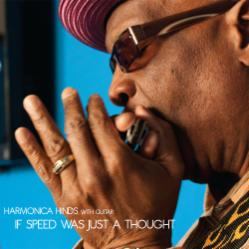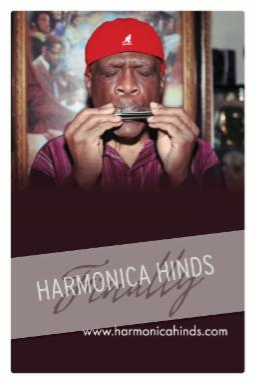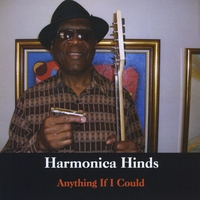
THIS WILL GIVE YOU AN IDEA OF THE SPIRIT AND SOUL OF HARMONICA HINDS
Artist: Harmonica Hinds
Song: If Speed Was Just a Thought
Reviewer: Nick DeRiso
Mervyn “Harmonica” Hinds, a regular on the Chicago blues scene for decades, was once one of the best sidemen that nobody knew. That’s changed more recently, as Hinds has begun issuing albums under his own name in regular intervals. The latest – If Speed Was a Thought, which follows 2008’s Finally and 2010’s Anything If I Could – may be his most complete effort yet.
“Calling the Musical Spirits,” the first of 14 straight originals here from Hinds, begins with a trestle-rattling harp signature and this low levee moan – quickly setting a trance-like sense of portent on If Speed Was a Thought. As the track continues, though, Hinds begins to subtly, then not so subtly, pick up speed – like a freight train moments after topping a country hill. Soon, “Calling the Musical Spirits” has taken on a ferocious propulsion, with Hinds’ twin wails – on the harmonica and then at the mic – turning what was once an easy-going reminiscence into a heart-stopping ride.
“I Wonder” finds Hinds taking his first conventional vocal, and his singing retains that sense of slurred, dirt-path mystery. Hinds’ tandem work on the guitar begins to move to the fore, too, as he fashions an echoing rockabilly groove. The title track weaves all of these threads together, showcasing Hinds’ facility with a darkly intriguing lyric, with a gravy-dripping guitar riff, with a scarifyingly direct vocal and with a lonesome harmonica interlude.
From there, If Speed Was Just a Thought continues to brilliantly alternate between rumbling roadhouse songs (“Spices,” with its serrated rhythm; “She,” a gruff come on; “Mix Up,” which moves from melancholic wonder to a driving-rain beat) and these devastatingly emotional laments (the terrifying chain-gang hollers of “Blues Moan”; the end-of-your-rope cries of “I’m Bombarded”).
Throughout, he plays both the country blues and its urban-bred cousin with equal force and intellect.
As for the latter, “Kick It” perhaps best recalls the tough city blues of the early Chess sides, and that’s fitting since Hinds rose to early fame as a member of the 1970s-era house band at the legendary Theresa’s Lounge in Chicago – where he was joined on stage by mythical blues figures like Junior Wells. He’s worked as a sideman on albums by Koko Taylor, Eddie Taylor Jr., and Mud Morganfield, among others, and has appeared on stage with the likes of Pinetop Perkins, Willie “Big Eyes” Smith, Louisiana Red, Willie Dixon, Magic Slim and Willie Kent.
You hear bits and pieces of those legacies throughout this moving, deeply personal journey of record. When Hinds, as part of a frank remembrance of hard times called “Traveling on This Road,” talks about “so many ups and so many downs,” there’s a bone-deep sense of authenticity.
That song’s clip-clop rhythm signature returns on “I Want to Know What Made You So,” this sharply worded complaint about a hot-and-cold love interest that ends up as one of Hinds’ better explorations of a relationship’s rugged landscape. Meanwhile, “Pretty Lady,” with its string-popping guitar signature, takes a similarly dim view of these matters of the heart, with Hinds recalling how a lover’s beauty couldn’t mask her propensity to stray. By the time he gets to “You Gone Too Long,” though, Hinds’ stance has softened some. Moaning behind a sharply insistent pairing of guitar and harp, he can only beg her to “come on home … please … come on home!”
There’s more to If Speed Was Just a Thought, however, than love gone wrong and love long gone. A strong sense of faith works as a backstory for the project, from its haunting opening cut to the fleet album-closer “Religion” – when Hinds, offering a wordlessly boisterous interpretation of salvation’s soaring gift, brings it all home once again.
Review by Nick DeRiso
Rating: 5 stars (out of 5)
All tunes on these CDs are originals.
Hope you enjoy the vibes.
LIVING BLUES
VOL.39.#6
LIVING BLUES #198 DECEMBER 2008
HARMONICA
HINDS
Finally
Harmonica Hinds-(No#)
Mervyn "Harmonica" Hinds has been a regular on the Chicago blues scene for over thirty years, with the occasional recording session behind artists such as Koko Taylor, John Primer, and Eddie Taylor Jr., but very little under his own name. This self-produced effort, with Taylor Jr. and Tom Holland on guitars and a first-call rhythm section of bassist Greg McDaniel and drummer Kenny Smith should help to bring some long-merited attention Hinds'way.
The group steps out smartly with the Little Walter-style instrumental Wake The Spirit to open the set before Hinds steps up to the vocal mic on Goin' Down To The River, a brisk shuffle in a Jimmy Reed bag with Taylor Jr. taking his dad's guitar part. The slow blues It's So Cold features some nice Walters-influenced slide but at 8:28 drags on a mite long. Things pick up again with You Got It Good, an instrumental featuring chromatic harp and a distinctive surging beat. Next up is the after hours instrumental Take Your Time, with slide in the Robert Nighthawk/Earl Hooker mode. Stop Complaining takes us back to Eddie Taylor territory before the stripped-down Imelda and an aptly titled Harmonica Hinds Shuffle.The band nails the Howlin' Wolf rhythm of Don't You Steal My Money, with slide from the Elmore James school this time. Hinds turns philosophical on the album's last three cuts, contemplating his mortality on Can't Stay Here For Ever and That Old Dichotomy before finishing with a Connected To The Sun that would not have been out of place on Sun Ra's Saturn label.
This is one of the most enjoyable albums in the classic Chicago blues style to come down the pike lately-let's hope that the title should be taken to mean "finally"as in "at last," and not as in "the last."
-Jim DeKoster
BLUES REVUE
ISSUE # 116 FEB/MAR 2009
HARMONICA HINDS
Finally
self-release
Harmonica Hinds is a fixture at Buddy Guy's Legends in Chicago, where he often performs solo on acoustic guitar and harmonica. After seeing the cover of Finally-a photo of Hinds blowing harp without
a microphone-you expect a laid -back folk-blues set, but the first track, the aptly titled "Wake the Spirit," is a vigorous electric boogie. As soon as you hear the opening note, you know that the
five-man band (including Kenny Smith on drums and Eddie Taylor Jr. on guitar) is ready to go to work.
One of the most talented musicians on today's Chicago scene, Hinds has appeared on albums by Koko Taylor, Lefty Dizz, and John Primer. Yet his harmonica work is never mere icing on someone else's
cake. Finally adheres to the Fifties Chicago blues tradition, but Hinds clearly appreciates variety: "You Got It Good" sounds like a minor-key theme from an old Western, and on "Take Your Time" and
"Can't Stay Here Forever," Smith keeps time on a hi-hat cymbal rather than a full drum kit. The effect is startling in the best way possible, especially considering the latter song's sobering,
omnious lyrics, which remind us that we go around only once in this life.
Hinds is a traditionalist, and he's fortunate to work with players who have the same musical values. True to its title, the arrival of this album will make fans of Chicago blues say, "Finally!"
-James Porter
BLUES & RHYTHM
No 233 OCT 2008
HARMONICA HINDS: Finally
Harmonica Hinds Music (64:52)
Wake The Spirit/ Goin Down To The River/ It's So Cold/ You Got It Good/ Take Your Time/ Stop Complaining/ Imelda/ Harmonica Hinds Shuffle/ Don't You Steal My Money/ Can't Stay Here Forever/ That Old
Dichotomy/ Connected With The Sun
The title of this release is very apt; as a full length CD from this Chicago master, who inhabits those out of the way neighbourhood places, and who also enjoys a regular gig at Buddy Guy's Legends
is long overdue. Long timers may remember that Hinds was part of the 1977's startling 'New Generation Of Chicago Blues' package that included the then young Lurrie Bell, Billy Branch, Vernon and Joe
Harrington, and James Kinds, that Jim O'Neal and Willie Dixon put together for that famous gig at the Berlin Jazz Festival. He also appeared on Koko Taylor's 1978 'Earthshaker' CD on Alligator.
Hinds has remained active over the years on the Chicago blues scene and these days he can be seen often with Eddie Taylor Junior, playing gigs around Chicago, as well as doing his own shows. Eddie
appears on this disc supporting Hinds on guitar and Eddie's slant on the blues complements Hinds' perfectly, as both of their musical leanings are to the Chicago blues ensemble sounds of the the
fifties and early sixties.
Hinds appears on Eddie's latest Wolf CD, 'I Got To Make This Money Baby', which received a favourable review in B&R. He also has two numbers on the impending second volume of 'Diamonds In The
Rough, Chicago Blues Harmonica Project'. After toiling away out of the limelight for so long he is starting to enjoy a higher profile and it is a shame that it has taken so long , as he is clearly a
talented individual. He has strong hints of the second Sonny Boy and Little Walter in his harp playing and his voice has a nasal edge to it. The only criticism of this CD is that some numbers tend to
meander on too long and could have been shorter and more focussed.Taylor plays with his usual subtle and never flashy charm throughout and young Kenny Smith, on drums, keeps that Chicago beat. The
set was recorded at two sessions in Chicago in the spring of 2008 and features original material from Hinds.
Things start off well with the upbeat, near boogie instrumental,'WakeThe Spirit', with fine chording from Taylor and great harp work from our man.'You Got It Good' is similar with an infectious and
repetitive guitar line pushing the number along and features Hinds blowing away on the chromatic. The instrumental 'Take Your Time' is nice, easy and slow and well constructed. 'Harmonica Hinds
Shuffle' is exactly what the song title states, an infectious instrumental with Taylor playing subtle slide guitar lines. The band and Hinds collectively brew up a storm on the uptempo 'Don't You
Steal My Money'. That lump de lum Chicago Chicago shuffle sound is never far away; 'Stop Complaining', 'Can't Stay Here Forever' and 'That Old
Dichotomy' are good examples of that style. Overall this disc is very much a winner and worthy of your
attention, especially if you like the sounds of Eddie Taylor Junior, his father and Snooky Pryor et al.
Mike Stephenson
The blues, from a technical standpoint, is as simple as music gets, three chords, one scale and a shuffle rhythm and one is well on their way to building up their blues repertoire. But, for such a
“simple” music, it is surprising at how many people miss the key emotion that makes the blues the legendary music that it is. At heart, the blues is nothing without a strong emotional proponent
behind every bent note, every dominant chord and every twelve-bar recap, and when it is done right, there is something magical about the blues that few other genres can capture. Chicago based blues
artist Harmonica Hinds definitely gets this concept, and his album Anything If I Could is filled with everything that makes the blues great.
Whereas the blues has taken a turn towards the more technically proficient artists in recent years, including guitar virtuosos Johnny Lang, Joe Bonamassa, and Kenny Wayne Shepherd, this newfound focus has not only opened doors for artists of a similar nature to walk through, but has also left a taste in modern blues audiences for a more laidback approach to the genre. Hinds satiates this hunger with his relaxed and high-emotion approach to blues. Songs such as “Cuddle Inn” are a good example of everything that makes Hinds’ music great. The song is based around a strong shuffle beat, and the harmonica and guitar solos are notable as much for the notes that they don’t play as the ones they do. By effectively using space in his playing, Hinds creates an atmosphere of both suspense and interaction during the track. Relying on the blues foundation of call and response interaction, Hinds allows each line to breathe before he moves onto his next idea, bringing a sense of organic flow to his phrases that might have been lacking had he tried to relying more handedly on his chops rather than his ears and musical instinct.
Now, don’t confuse laidback and simplified with boring and monotonous. In fact it is just the opposite. Take a song like “You’re Looking Good.” Here, Hinds kicks back on a slow shuffle groove, with some tasty guitar fills backing his Tom Waits style vocals and just enough harmonica work behind the melody to keep the listener wondering what’s coming next. While other artists might have been tempted to fill this space with long feats of fret board gymnastics and screaming harmonica work, Hinds plays with each moment of silence in the same way a skilled painter uses the bare spots on his canvas. These are not “blank” moments that have yet to be filled. They act as musical frames, enclosing and showcasing the moments that Hinds and company create. Listening to the interaction between notes and rests in this ensemble is as entertaining as it gets, which is a lesson that a lot of blues players could learn from.
Anything If I Could has everything that makes the blues great. The songs are well-written, the band is tight and firmly in the pocket on every track, and the ensemble understands that the blues goes beyond three chords and 12 bars. It is about the emotional intent behind each note, something that these musicians bring to the fold on every track. Though the blues catalogue is full of great artists and albums, this record deserves its shot at competing with the big boys. It is a great way to add a new name to even the most complete blues record collection.
Review by Matthew Warnock
Rating: 4 stars (out of 5)


